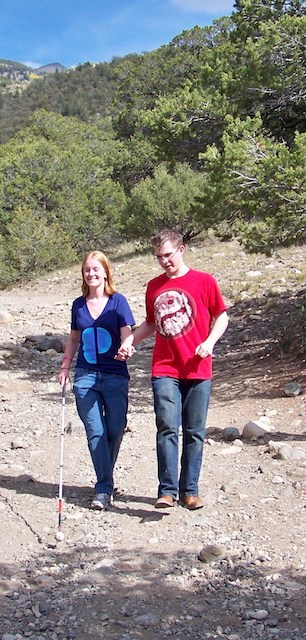
There has been much discussion and discord surrounding what the disability community has coined “inspiration porn,” and I admit I’ve found the lot of it quite troubling.
Many people with disabilities feel that classifying others as inspirational within the context of disability is demeaning, objectifying, and oppressive.
Though I firmly agree that not one population should be objectified or placed on a pedestal, I also strongly disagree with the facet of this perspective which seems to suggest that every instance of “inspiration porn,” whether in advertisements or everyday life, automatically equates that level of condescension, without consideration given to the intentions of the non-disabled individual.
Furthermore, I don’t think we get to decide what does or doesn’t, should or shouldn’t, inspire others. As a person with a disability myself, therefore, I feel the need to peaceably impart my opinion, with particular regard to the interpersonal side of things. My hope is to promote love and tolerance where bitterness and hostility seem to be cropping up. Although I admit I am in the vast minority for my view and have received plenty of criticism, don’t worry—I have a relatively thick skin.
Every perspective begins with a story, so here’s mine: The past few years have been particularly formative for me. Actually, though I was transitioning and growing a lot, “formative” may be too sterile a word. I experienced a sort of domino effect of unfortunate events which were ultimately life-changing: I lost a long-time boyfriend when I thought our relationship, though not perfect by any means, was stronger than ever.
Also, an organization I cared about promised and then rescinded a job offer, leaving me to resume the seemingly impossible quest to secure gainful employment as a blind person. I fell on train tracks before an idling monster of a train and had to relearn how to walk. The list went on.
For whatever reason, it seemed like anytime I put my hope in anything or planned any course of action, the floor dropped out from under me like a trapdoor. I was in pain for a long time, because I thought no matter what I did, I couldn’t be happy. It was like the universe simply wouldn’t allow it. Don’t we all feel that way, sometimes?
Thankfully, all of those things have righted themselves in my world. The boy is back, and we now have our first apartment together. Corporate America can be tough, but I’ve finally found job security and acceptance in my employer. I’ve published a book of poetry, and even though it’s not hugely popular, it means a lot to me. When my baby sister, also blind, was hit by a car last summer and experienced similar injuries to those I sustained in my rail platform accident, I was able to be there for her in a truly special way because I’d lived it.
But I had to go to the bottom before I came back up, so during my periods of grief and growth, one thing that got me through the hard times was finding inspiration anywhere I could find it: a sky blue enough for me to see it, a particularly gnarly tree with a lot of character, a heartwarming cup of tea, a bone-chilling poem or song, and, you guessed it, other people. If someone had a good attitude, if someone had a lot on their plate and persevered in spite of it, if someone had a great sense of humor—I was inspired. Don’t we all feel that way, sometimes?
The sweeping generalization is that as people with disabilities, we shouldn’t be candidates for inspiration. I think this is, perhaps, reversely discriminatory to the non-disabled community in the moments when they wish to relate to and form allyship with us.
It’s true that many are as yet uneducated that while disability is no cakewalk, it’s not the end of the world either. But even so, maintaining that one population should not be objectified or placed on a pedestal, it raises the question: Who’s to say that it’s merely our disabilities themselves, and not some aspect of the disability experience, which impresses, intrigues, or—gasp!—inspires non-disabled individuals?
Maybe someone is grappling to accept a hidden disability, sees someone who is out and proud about their apparent disability, such as blindness, cerebral palsy, or Down syndrome, and finds inspiration in that person’s confidence. Maybe a newly disabled person finds hope and comfort in meeting someone who’s been disabled since birth and knows the ropes. Maybe a non-disabled ally mourns for their loved one with a disability who doesn’t have as much confidence or opportunity, and therefore wants to help create change.
Maybe a non-disabled onlooker, unfamiliar with disability culture, tries to place themselves in the person with disability’s shoes anyway, perceives that it must be hard (because let’s be real, it really does suck sometimes), and gains respect for them in the process. This is the simple, human act of exercising empathy, which is becoming a rarer gem by the day because people are afraid to feel pain, let alone others’ pain, or whatever emotion is applicable. As such, I recognize and applaud all instances of empathy, even, often, within the context of “inspiration porn.”
The thing is that, yes, people with disabilities can be exploited on account of being allegedly inspirational, and I have seen it. I’m not denying the existence of ableism. But that’s often a product of the media or a lack of immersion in disability culture. All told, I don’t support that condescension is always, or even usually, the case. People on the street are inspired by other people: wise elders, would-be overextended parents, great artists or athletes, respectable teachers and ministers, people enduring hardship gracefully, the list goes on. And yet, rarely do I ever see the situation getting touchy until it comes to people with disabilities.
I think for people with disabilities to police the non-disabled community as much as we do on this account only serves to separate us all from one another. Instead of educating those who ask, “How do you do it?” and bridging both real and perceived gaps in the process, we shun or berate or deride people who could become great ambassadors between the disabled and non-disabled communities.
We instill fear in their hearts with regard to future interactions with us or incite bitterness and prejudice toward people with disabilities at large. I can’t stress enough how many times I’ve heard, “I was afraid to come up to you, but I’m glad I did. You’re so nice. I asked someone once if he needed help with his wheelchair, and he blew up at me. I tried to talk to a girl with a white cane like yours, and she blew me off.” (And then, of course, I mentally kick myself for having reacted similarly a number of times in the past.)
In this vein, we can be just as discriminatory toward non-disabled people as truly prejudiced individuals can be toward us. Do I think that we can, or should be, at top form at all times? No, that wouldn’t afford us the imperfection that is being human, and let’s face it, yes, it can be a little exhausting to be in “educate mode” all the time.
Do I believe we should tolerate or stand for oppression, objectification, exploitation, misinformation? Of course not. We should do everything within our power to change or correct those things, but we should do so in love, because in working toward smaller unities, we set a precedent for greater ones.
I thought I was above being an inspiration to others until I hit rock bottom myself and had to find inspiration in anything I could in order to survive. Now, even when I run across someone whose delivery isn’t the most tactful, I do my best to gently educate them and form an alliance, because I know that I’m dealing with a well-intentioned human being who has just as much right to respect as I do.
Sometimes, if the opportunity arises, I may ask why someone felt inspired by me, giving them the chance to explain and share instead of assuming that they find me inspiring merely on the basis of my blindness. And guess what? I am told all the time that I am an inspiration, not just because of my blindness, but because of my artwork, or my outlook, or my smile, or my kindness toward others—and I am told this both by strangers and people who’ve known me nearly my whole life.
Being seen as a person who can, instead of a person who can’t or shouldn’t, makes me happy. Knowing I’ve helped someone, even if I don’t always understand how, makes me happy.
~
~
~
Author: Mel Finefrock
Image: Courtesy of Author
Editor: Travis May








Read 0 comments and reply